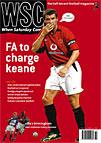 Harry Pearson welcomes a new biography of the Charlton brothers that looks more sympathetically on Bobby's personality and flays his detractors
Harry Pearson welcomes a new biography of the Charlton brothers that looks more sympathetically on Bobby's personality and flays his detractors
When it comes to the Charlton brothers, most people probably concur with the assessment Big Jack apparently delivered to Ron Atkinson: “Our kid was the better footballer, but I am the better bloke.”
In this biography of the two very different Northumbrians, Leo McKinstry – a former Labour party activist and author of a well received book on Geoff Boycott – doesn’t quite reverse that opinion, but he does present a much more sympathetic portrait of Bobby than has appeared in print for some while. At the same time he does little to discredit the view that in a world where every cynical poltroon lays claim to being courageously honest and free of bullshit, Jack is the genuine article. The result is a thoroughly entertaining and ultimately rather uplifting read.
As Jack & Bobby makes plain, the elder brother remains fiercely loyal to his younger sibling despite their falling out. The cause of that, as has been well documented, was Bobby’s estrangement from their mother, Cissie. Cissie Charlton was a tough northern matriarch and plainly didn’t much care for Bobby’s wife, Norma. Maybe Norma’s coolness was partly defensive. Because while everybody likes Jack (well, everybody except Eamon Dunphy and Roy Keane), Bobby, for all his gifts on the field, is a different kettle of cold fish – in Brian Labone’s words “a bit of a sad sack”.
Bobby was a natural conformist who paradoxically failed to fit in. As a consequence he was derided by team-mates like Denis Law (who caustically referred to him as “Sir Bobby” decades before that title was officially bestowed) and Paddy Crerand (who dubbed him “the imposter” because he thought his abilities so wildly over-rated). He was also mercilessly baited by George Best – asked to name the biggest influence on his career on a TV chat show, Best sarcastically replied “Cissie Charlton”.
Despite that, McKinstry finds plenty of former players prepared to testify to Bobby’s charm, kindness and the hilarity of his Ben Turpin impression. And it’s hard to imagine that if he was really quite as aloof as has been alleged, Bill Shankly would frequently have called round at his house unannounced for tea, biscuits and hours of football talk. Despite all the glowing endorsements to his gentlemanliness McKinstry has accumulated, in the end perhaps the greatest testimony to Bobby’s essential decency is the list of those who hate him. After all, anyone who’s earned the enmity of Law, Crerand and Big Ron can’t be all bad.
And then there is that other Charlton detester, Best. McKinstry doesn’t have much time for “El Beatle” and delivers an impassioned diatribe about the injustice of the Irishman being more popular than his dedicated and well-behaved team-mate that recalls the speech Anthony Hopkins delivers about John F Kennedy in the Oliver Stone movie Nixon.
In light of the apparently endless parade of lard-chopped middle-aged men who appear on our TV screens tittering about Besty’s, y’know, way with “the ladies”, it’s hard not to sympathise with the author’s position. As he says, Best treated United like dirt and short-changed the fans by his absences, while Charlton gave his life (almost literally) to the club and never offered less than total commitment. Yet who do the supporters at Old Trafford idolise? In the end, as with JFK, it all boils down to the power of looks and charm.
McKinstry makes his point well enough, but when it comes to swatting Georgie boy, Big Jack inevitably does it better. During a trip to Lisbon to play in Eusebio’s testimonial, the Leeds centre-half meets up with Best and Tommy Docherty on the hotel terrace. For five minutes he listens to Best bellyaching about what he will and won’t do until finally, he remarks: “I was so disgusted I got up and walked away. He was just a fat little fellah who had been wasting his time.”
Those, like Best, who criticise Bobby for his reticence and distance rarely seem to consider the effect the Munich air crash might have had on him. As a United room-mate Ronnie Cope comments: “Bobby altered unbelievably after Munich. He never got back to being a joker, the Bobby Charlton I had known as a lad. He became withdrawn. Sometimes you’d ask him a question and it was like he just didn’t hear.”
Given that Charlton was just 21 at the time of Munich and was seriously injured, while many of his closest friends died, that seems entirely understandable. While he is undoubtedly deeply conservative, publicly awkward and may not have visited his mother as often he should have done, you come away from this book feeling that a little compassion might be in order.
From WSC 188 October 2002. What was happening this month